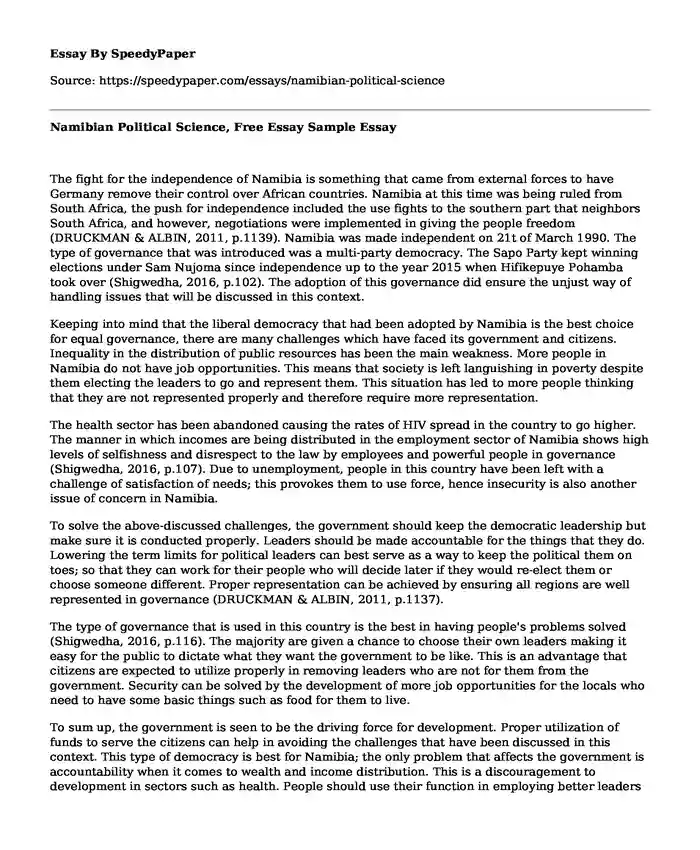
| Type of paper: | Essay |
| Categories: | Political science Independence |
| Pages: | 3 |
| Wordcount: | 659 words |
The fight for the independence of Namibia is something that came from external forces to have Germany remove their control over African countries. Namibia at this time was being ruled from South Africa, the push for independence included the use fights to the southern part that neighbors South Africa, and however, negotiations were implemented in giving the people freedom (DRUCKMAN & ALBIN, 2011, p.1139). Namibia was made independent on 21t of March 1990. The type of governance that was introduced was a multi-party democracy. The Sapo Party kept winning elections under Sam Nujoma since independence up to the year 2015 when Hifikepuye Pohamba took over (Shigwedha, 2016, p.102). The adoption of this governance did ensure the unjust way of handling issues that will be discussed in this context.
Keeping into mind that the liberal democracy that had been adopted by Namibia is the best choice for equal governance, there are many challenges which have faced its government and citizens. Inequality in the distribution of public resources has been the main weakness. More people in Namibia do not have job opportunities. This means that society is left languishing in poverty despite them electing the leaders to go and represent them. This situation has led to more people thinking that they are not represented properly and therefore require more representation.
The health sector has been abandoned causing the rates of HIV spread in the country to go higher. The manner in which incomes are being distributed in the employment sector of Namibia shows high levels of selfishness and disrespect to the law by employees and powerful people in governance (Shigwedha, 2016, p.107). Due to unemployment, people in this country have been left with a challenge of satisfaction of needs; this provokes them to use force, hence insecurity is also another issue of concern in Namibia.
To solve the above-discussed challenges, the government should keep the democratic leadership but make sure it is conducted properly. Leaders should be made accountable for the things that they do. Lowering the term limits for political leaders can best serve as a way to keep the political them on toes; so that they can work for their people who will decide later if they would re-elect them or choose someone different. Proper representation can be achieved by ensuring all regions are well represented in governance (DRUCKMAN & ALBIN, 2011, p.1137).
The type of governance that is used in this country is the best in having people's problems solved (Shigwedha, 2016, p.116). The majority are given a chance to choose their own leaders making it easy for the public to dictate what they want the government to be like. This is an advantage that citizens are expected to utilize properly in removing leaders who are not for them from the government. Security can be solved by the development of more job opportunities for the locals who need to have some basic things such as food for them to live.
To sum up, the government is seen to be the driving force for development. Proper utilization of funds to serve the citizens can help in avoiding the challenges that have been discussed in this context. This type of democracy is best for Namibia; the only problem that affects the government is accountability when it comes to wealth and income distribution. This is a discouragement to development in sectors such as health. People should use their function in employing better leaders for better Namibia.
References
DRUCKMAN, D., & ALBIN, C. (2011). Distributive justice and the durability of peace agreements. Review of International Studies,37(3), 1137-1168. https://www.jstor.org/stable/pdf/23025414.pdf?ab_segments=0%252Fdefault-2%252Fcontrol&refreqid=excelsior%3A478d3795c0ca9f648a542e082e63f792
Shigwedha, V. (2016). The return of Herero and Nama bones from Germany: The victims' struggle for recognition and recurring genocide memories in Namibia. In Dreyfus J. & Anstett E (Eds.), Human Remains in Society: Curation and Exhibition in the Aftermath of Genocide and Mass-violence (pp. 197-219). Manchester: Manchester University Press.
Cite this page
Namibian Political Science, Free Essay Sample. (2022, Feb 23). Retrieved from https://speedypaper.com/essays/namibian-political-science
Request Removal
If you are the original author of this essay and no longer wish to have it published on the SpeedyPaper website, please click below to request its removal:
- Free Essay on Petroleum and Natural Gas Issues
- Types of Bullying in Our Free Essay
- Free Essay Sample on Ear Diseases
- Baby Boomers Airline. Free Essay Sample
- Essay Sample on Product Failure Research
- Essay Example about Federalism and Constitutional Debates
- School Vaccines Should Be Repealed - Argumentative Essay
Popular categories




